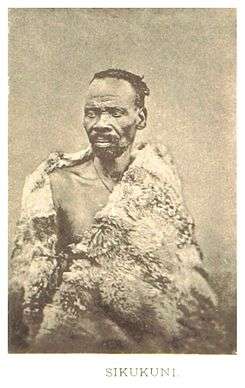Sekukuni
| Sekhukhune I | |
|---|---|
 | |
| King of the Bapedi People | |
| Reign |
September 1861 – August 1882 (21 years) |
| Successor | Sekhukhune II |
| Born | 1814 |
| Died | 13 August 1882 (aged 68) |
| Father | Sekwati |
Sekhukhune or Matsebe Sekhukhune, (1814–1882), the son of King Sekwati, was king of the Bapedi of Sekhukhuneland currently known as Mohlaletse village, in the present day Limpopo Province of South Africa. He became king upon his father's death in September 1861, married Legoadi IV in 1862 and lived at a mountain, now known as Thaba Ya Leolo,[1] which he fortified.
As the Bapedi paramount leader he was faced with political challenges from the Boer, the independent South African Republic (ZAR) and the British Empire, with considerable social change caused by Christian missionaries.[2]
Sekhukhune Campaigns
He fought two wars: first successfully in 1876 against the ZAR and their Swazi allies, then unsuccessfully against the British and Swazi in 1879 during the Sekukuni Wars.[2][3]
Sekhukhune was held until 1881 in Pretoria, then assassinated by a rival, Mampuru, after fighting for the leadership of the Sekhukhune 1882.[4]
See also
References
- ↑ Du Plessis, E. J. (1973). 'n Ondersoek na die oorsprong en betekenis van Suid-Afrikaanse berg- en riviername: 'n histories-taalkundige studie [An Investigation into the origin and meaning of South African mountain and river names: a historico-linguistic study] (in Afrikaans). Cape Town: Tafelberg. p. 187. ISBN 978-0-624-00273-4.
- 1 2 "Sekhukhune 1814 - 1882". sahistory.org. Archived from the original on March 13, 2008.
- ↑ Kinsey, H.W. (June 1973). "The Sekukuni Wars". Military History Journal. The South African Military History Society. 2 (5).
- ↑ Delius, Peter (1984). The land belongs to us: the Pedi polity, the Boers and the British in the nineteenth-century Transvaal. Heinemann. pp. 251–252. ISBN 978-0-435-94050-8.